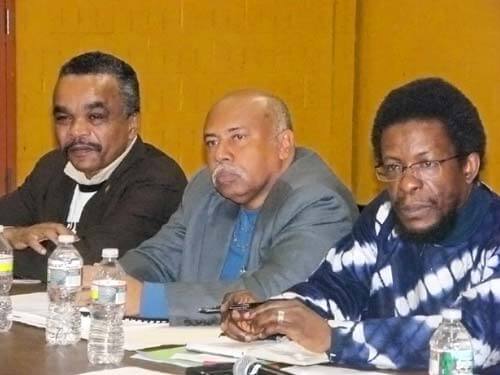The board of directors of the Bronx-based Garifuna Coalition U.S.A., Inc. says that it was “pleased” with the recent consultation meeting the proposed St. Vincent and the Grenadines Policy Framework and Development Strategies for the Cultural and Creative Industry.
“The Garifuna Coalition U.S.A. Inc. stands ready to establish a mutually beneficial strategic partnership with the Government of St. Vincent [and the Grenadines] in the promotion of the St Vincent and the Grenadines Policy Framework and Development Strategies for the Cultural and creative Industry,” Jose Francisco Avila, chairman of the Board, told Caribbean Life about the meeting, which was held at the Friends of Crown Heights Educational Center in Brooklyn, New York.
“The consultation was a dialogue and partnership between all parties, government, and industry practitioners to bring to the forefront the need for decisive action to be taken by industry and government in order to address challenges, encourage new development initiatives, and support the enhancement of existing activities,” Avila added.
Frank Palacios, co-owner of the Budari Dance Company, Lucy Blanco and James Lovell of the Afri-Garifuna Jazz Ensemble, and Mariano Martinez, president and chief executive officer of J. Dove Productions, Inc. represented the Garifuna Cultural and Creative Industry.
Also in attendance were Rosita Alvarez, president of the Garifuna Settlement Day Cultural Mass Committee and Aquina Valentin, board member of the Garifuna Coalition U.S.A., Inc.
Minister of Tourism, Sports and Culture Cecil “Ces” McKie led the consultation.
The panel included Avila; Selmon Walters, U.S. Consul General; Maxwell Haywood, chairman of the St. Vincent and the Grenadines Diaspora Committee of New York, Inc.; and Joanne Legair, chair of the Culture Committee of the Council of St. Vincent and the Grenadines Organizations U.S.A., Inc (COSAGO).
“Part of our responsibility is to engage all the stakeholders and persons of interest in culture in St. Vincent and the Grenadines, as well as the Diaspora to examine other existing culture policies in the region to look at the various protocols as they relate to culture in St. Vincent and the Grenadines,” McKie told participants.
“And after the discussion, to come up with a document, which will then discuss the new proposed policy; and that will be ratified by the ministry, by Cabinet, and then brought into a final version,” he added.
Walters said it was “a worthwhile venture,” adding that the Diaspora provide its input in the government’s proposed policy.
“More and more governments are looking to the Diasporas as a development resource,” he said.
“Therefore, it’s important that you play a role in fashioning the new Cultural Policy,” he added.
Avila said the draft Cultural Policy “represents a clear demonstration of the significance of culture and cultural activities to national development.
“It speaks to the broad socio-economic development implications and impact of culture, and emphasizes the government’s identification of culture and the arts as vital to individual and national development,” he said.
The project’s objective is “to create a sustainable enabling business environment, which provides opportunity for the private sector to increase investment and create capacity or economic competitiveness”.
Avila said the Policy Framework and accompanying Development Strategy are designed, therefore, to “create the basis on which to build an environment for the commercialization of cultural products and services, so that persons involved in the cultural industries can be adequately rewarded for their efforts.”
Haywood, a United Nations development officer, described the meeting as “highly successful,” stating that it was a “lively discussion by the over 40 participants who represented various forms and levels of the cultural arts.”
He said participants urged, among other things, that greater emphasis be placed on encouraging the youth to pay more attention to the cultural arts; that emphasis be placed on educating the next generation of artistes; cultural education be taught to students as early as in pre-kindergarten; gender issues within the nation’s culture be addressed; and the country be promoted as a “cultural destination.”
“Marketing strategies could make a huge difference in promoting the cultural arts industry of SVG (St. Vincent and the Grenadines),” said delegates, according to Haywood.
“A marketing strategy for the cultural arts should have a focus on Central America, where the Garifuna communities exist,” they added.
“Moreover, marketing SVG’s carnival is too weak. Attention must be paid to the way we sell the carnival at home and abroad,” they continued, stating that “appropriate people must be in place to do this effectively and efficiently.”
In addition, delegates recommended that a sample of Vincy Mas be “paraded in carnivals in different countries.”
“We need to pay more attention to the quality of our cultural arts output,” they said, adding that training in the arts is “vital.”
“There should be more attention paid to the way we present our products,” delegates said.
“Training opportunities should be provided for workers in the cultural arts creative industry, and workers should also seek these opportunities on their own,” they added. “Cultural arts must also be seen as a business instead of just a hobby.”



























